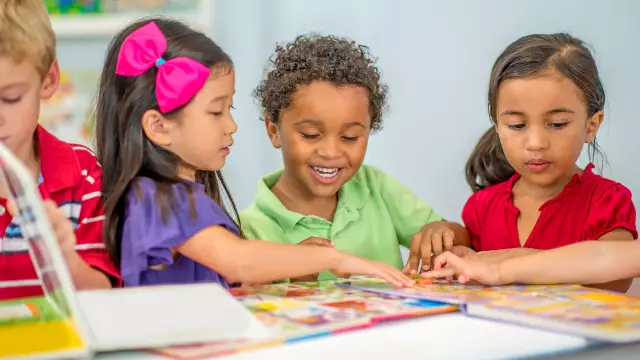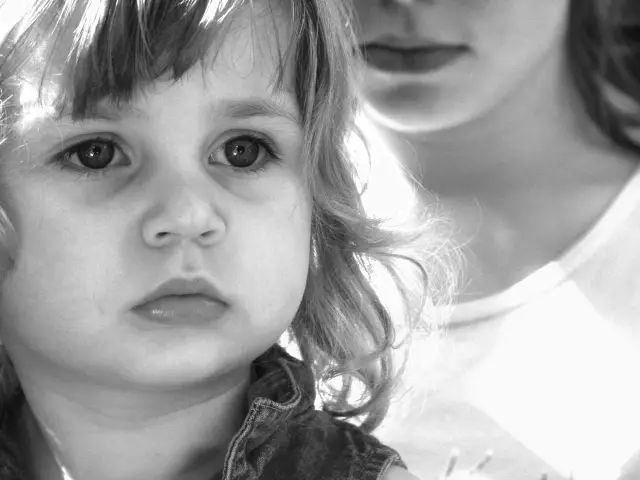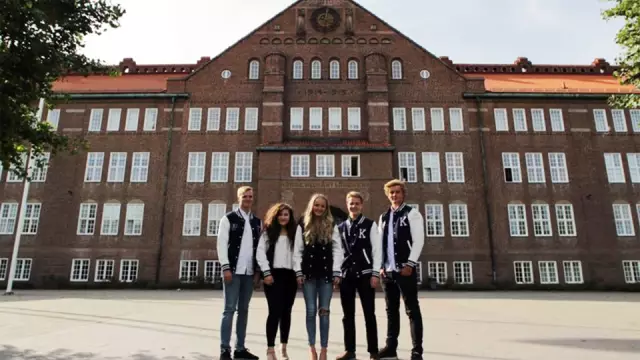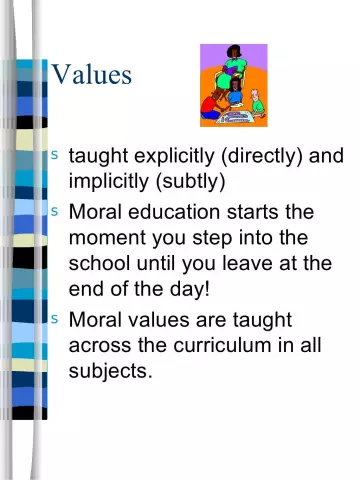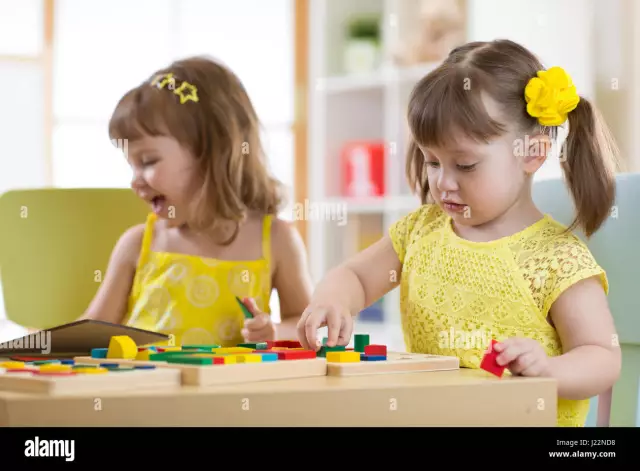- Author Rachel Wainwright wainwright@abchealthonline.com.
- Public 2023-12-15 07:39.
- Last modified 2025-11-02 20:14.
Preschool education of children
Preschool education of children includes several different directions.

On the one hand, this is the formation of universal human values necessary for a child to grow up to be tolerant, self-confident and sociable. On the other hand, this is the time when it is necessary to prepare him for school, to lay down the basic skills and concepts.
Basic principles of early childhood education
With the changes taking place in society, the approach to raising children is changing. If earlier children were influenced by imposing a sense of guilt on them, instilling the right habits with coercion and prohibitions, today modern children do not actually react to such methods. That is why psychologists and progressive educators believe that the basic principles of upbringing children of preschool age should be revised taking into account the changes that have taken place in society.
Modern methods of education are based on mutual respect and cooperation between adults and children, while the necessary trust and openness of relations requires great dedication from adults, who also need to change their own stereotypes for the successful preschool education of children.
It is possible to highlight the basic principles on which the upbringing of children is based today:
- A respectful attitude that does not tolerate humiliation, violence and authoritarian pressure;
- Freedom of choice, which allows the child to fully reveal the abilities inherent in him. At the same time, we are not talking about complete freedom without adult control. It is necessary to create the conditions necessary for the all-round development and preschool education of children, which allow, in a safe environment, to acquire knowledge and skills as easily and simply as possible;
- Assistance in making a decision, which consists in showing the advantages, disadvantages and possible consequences of certain actions;
- An explanation of your requirements and actions. This will allow the baby to understand that the adult does not put pressure on him, but tries to protect him from danger or teaches the discipline necessary in life;
- Constant communication, which allows not only to establish a trusting relationship between parents and the child, but also contributes to the development of correct speech;
- Support for any undertakings and encouragement of initiative, which will allow you to develop self-confidence and responsibility for your actions;
- Manifestation of feelings in relation to the child. It seems to many parents that the child a priori knows that he is loved. However, this is not true, and the baby needs daily confirmation that he is really loved. Love can be expressed in a variety of ways - with sweet words, time spent together, and approval.
Parenting and preschool education of children
The principles of upbringing children of preschool age determine the work of a teacher of a preschool institution and are necessary for successful learning and complete assimilation of the necessary knowledge by a child.
During the preschool education of children and the organization of the learning process, the task of the educator and teacher is to create the necessary conditions for increasing the general cognitive activity of children, the formation of a positive attitude towards educational activities, the education of independence and working capacity.
One of the basic principles of preschool education of children and the formation of the qualities of a child's personality is consistency and consistency. Thanks to this, all the necessary skills and knowledge are presented depending on the age with a gradual increase in complexity.
The systematic nature of training includes the following concepts:
- The provided educational material should reflect various aspects of the surrounding reality and be generalized into a single system of knowledge;
- The qualifications of the teacher should allow him to convey the necessary knowledge as the complexity increases, taking into account what the child can understand depending on age and abilities;
- The curriculum should contribute to the gradual development of logical thinking and include its various components - comparison, analysis, synthesis, generalization, abstraction, development of deductive forms of thinking;
- The ultimate goal of the lesson should be understanding and assimilation of new material, as well as the development of feelings, attention, imagination, memory and the formation of such character traits as determination and perseverance in overcoming emerging difficulties.
In addition, another prerequisite for building the right learning process is the availability of training material. The pedagogy of M. Montessori is based on this principle, who believed that for the all-round development of a child it is necessary to provide him with all the aids and didactic materials necessary for this. Activities with children should stimulate cognitive activity.
Any material or symbolic model can serve as a visual aid. However, you need to understand that this is just a tool of knowledge, not a goal. Therefore, when using them, you need to take into account its content and the possibility of feedback.
The upbringing and preschool education of children should be based on an individual approach, taking into account the personal characteristics of the child's character, temperament, inclinations and abilities. An individual approach to teaching and upbringing significantly increases the effectiveness of classes and allows you to more fully reveal talents at an early age.
Thanks to the individual approach in preschool education of children, the teacher can fully study the personal characteristics of the child and identify the factors that have the most significant impact on him.
The principle of scientific teaching consists in the transition from the external description of the subject to its internal structure, from the knowledge of the phenomenon to its essence. Taking into account these requirements, educational material should be built, which will allow the child to get an idea of the diversity of the external world around him.
Another essential principle in preschool education of children is the strength of the knowledge and skills acquired. To do this, the educator must:
-
Be able to highlight the main thing in the studied material;

The main directions of preschool education of children - Show the relationship between the main idea of the material being studied and the child's knowledge, as a result of which the connections are consolidated, which makes it impossible in the future to lose the subjective significance of new knowledge in the child's mental activity;
- To consolidate the knowledge gained, they must be associated with the emotions, feelings and experiences of children. For this, you can use various games or fairy tales, which will cause an emotional response in the child;
- If possible, all the knowledge gained should be consolidated in practice. For this, you can use various didactic materials, as well as artistic means.
One of the tasks of upbringing and preschool education of children is the correct construction of cognitive activity, which will stimulate the development of logical and imaginative thinking. Therefore, the teacher must be able to explain the processes from different points of view and form the child's initial scientific concepts.
Found a mistake in the text? Select it and press Ctrl + Enter.

